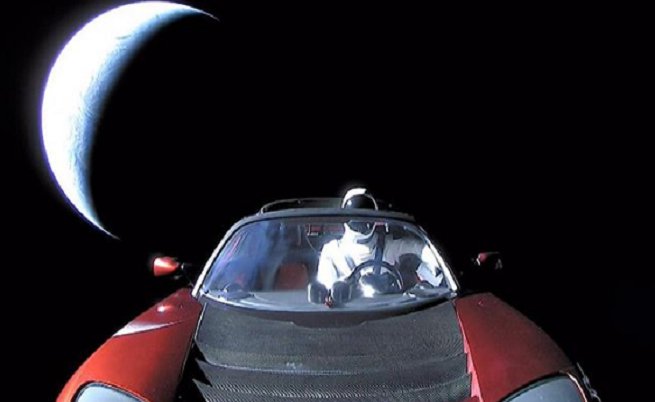
The launch of a car into space was a cunning promotional move by Ilon Musk to promote SpaceX and the first flight of the company's most powerful spacecraft. But the car is not just a waste of space. It is useful to astronomers, the BBC reports.
Scientists from the Czech Republic and Canada are watching the journey of Tesla Roadster and his "driver" - the star of the Star Man. The fate of the car will be interesting, but it is quite long.
Scientists have calculated the probable paths of motion of the vehicle in space. They believe it has a 6% probability of colliding with Earth within the next 1 million years. Even if this happens, the car will burn in the atmosphere and it is not a danger.
Astronomers also estimate that there is a 2.5% probability that the cosmic Tesla will collide with Venus, and almost no chance of being "parked" in the Sun or Mars. Scientists conducted a total of 240 simulations over 3.5 million years.
The simulations show two possibilities for the space Tesla. It either will remain in orbit around and between the planets in the inner solar system, or it will go further to the asteroids and other objects in the Kuiper Belt.
Both options will be interesting for scientists. "We do not know what to expect because the other objects we see near the Earth are asteroids, and they usually come from the farther parts of the solar system, but this time we do the opposite, we know the object comes from Earth and the question is where will go, "commented Hanno Rein of the University of Toronto.
Interestingly, there will be interaction between the car and the gravitational forces of other planets that can change their trajectory. For now, analyzes have shown that Tesla's orbit will be dominated by close encounters with Earth, and millions of years later, Venus.
As for a collision with an asteroid or other cosmic body, scientists do not expect this to happen. However, they are confident that the appearance of the car will be damaged due to collisions with miniature particles and space dust.
Because the car is quite small, it will soon disappear from the telescopes. Scientists expect the next closest space shuttle to the space Tesla will be in 30 years and will try to re-locate it.
source https://www.vesti.bg
Do you actually believe this BS; People are so gullible...
I bet Elon will have us on Mars by next month, please...
Newq